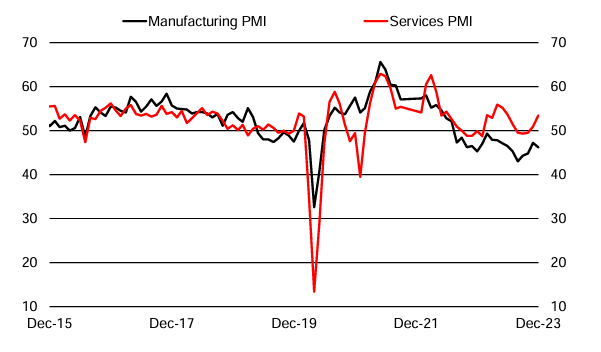GBP/USD Week Ahead Forecast: USD Strength Has Further To Run
- Written by: Gary Howes
- GBP/USD remarkably stable over past 5 weeks
- Hints at ongoing resillience
- But risks are tipping to the downside
- UBS selling GBP/USD this week
- Watch UK PMIs Wednesday
- U.S. PCE due Thursday

Image © Adobe Images
The British Pound could come under further pressure against the U.S. Dollar over the coming days amidst an ongoing reassessment of Federal Reserve policy and concerns centred around the strength of the UK economy.
The Pound to Dollar exchange rate lost half a per cent in value last week, but we note the pair has proven incredibly resilient in the past five weeks.
In fact, it has not closed below 1.2650 over these past five weeks, nor has it closed above 1.2750!
The declines that followed last Friday's retail sales figures are nevertheless flipping the risks to the downside, and this could be the week that we finally see some more concerted progress to the downside.
Above: GBP/USD at daily intervals. Track GBP with your own custom rate alerts. Set Up Here.
A move and test of the 200-day moving average at 1.2547 (the blue line in the above) looks like an agreeable short-term target that could be met in the next one to two weeks.
Strategists at UBS are, however, more strident in their expectations, targetting a move in the 1.24s as they single Pound-Dollar as a sell in their latest Trade of the Week recommendation.
"We recommend building up short exposure in GBPUSD at current levels of 1.2650 as the trade of the week," says Dominic Schnider, a strategist at UBS. "We look for 1.245 as a target level and would take losses should spot trade above 1.280."
GBP to USD Transfer Savings Calculator
How much are you sending from pounds to dollars?
Your potential USD savings on this GBP transfer:
$1,702
By using specialist providers vs high street banks
The British Pound has proven highly sensitive to data of late, as evidenced by the rally that followed last week's stronger-than-expected inflation reading and the slide that followed Friday's slump in retail sales.
Wednesday brings the release of S&P Global's PMI survey for January, which will give a strong hint as to how the economy fared in the first month of 2024.
"For the GBP resilience to extend into the coming days and weeks, the UK economic data has to show more meaningful signs of improvement," says Valentin Marinov, Head of G10 FX Strategy at Crédit Agricole.
Above: "PMI services strength unlikely to last" - UniCredit.
The market expects a reading of 46.7 for the manufacturing sector, 53.5 for the services sector and 52.3 for the composite reading.
The experience of last week showed risks are two-sided, which gives a simple rule of thumb that says the Pound can gain on upside surprises and fall on disappointment, with the scale of the move matching the scale of the deviation from consensus.
The key question to ask is whether there is anything on the economic docket that can halt the fading expectations for a March rate cut at the Federal Reserve in the coming days.
In short, no, and this is why the Dollar can be favoured as we head through the second half of January.
Track GBP and USD with your own custom rate alerts. Set Up Here.
"The high-yielding, safe-haven USD has regained ground across the board of late as central banks’ concerted push back against overly dovish market expectations has finally started to bear fruit," says Valentin Marinov, Head of G10 FX Strategy at Crédit Agricole.
"Higher US and global yields have weighed on risk assets, resulting in tighter global financial conditions, burnishing the currency’s safe-haven appeal," he adds.
Crucially, he says this trade that supports the Dollar has further to run:
"With the U.S. rates markets still attaching a c.50% chance to a Fed cut in March and pricing in c.130bp worth of rate cuts in 2024, we believe that the reassessment of the dovish market expectations is not over yet."
This week's excitement in the U.S. falls on Thursday with the release of GDP and the PCE inflation gauge.
Above: "GDP growth likely slowed in 4Q to a moderate pace" - UniCredit.
The U.S. core PCE reading for December forms the final major release ahead of the 31 January Federal Reserve policy meeting and thus could attract considerable attention.
In a weekly currency briefing, Crédit Agricole's Marinov says investors should focus on the risk of any downside surprises from the data given that the latest U.S. PPI data came in on the softer side and given that shelter costs – one of the key drivers of core CPI inflations upside surprise in December – enter Core PCE with a smaller weight.
But, with many Fed-related negatives still in the price of the USD, it would take notable downside inflation surprises to weigh on the currency ahead of the January Fed policy meeting, according to Marinov.
Indeed, Crédit Agricole's economists note recent data releases have suggested that the U.S. labour market remains tight and continues to fuel wage growth and thus domestic demand while
the U.S. disinflation process seemingly stalled in December.
"We expect that these developments could force the Fed to remain more hawkish than expected by the markets at present, in a boost to the USD’s relative rate appeal across the board," says Marinov.
GBP to USD Transfer Savings Calculator
How much are you sending from pounds to dollars?
Your potential USD savings on this GBP transfer:
$1,702
By using specialist providers vs high street banks







